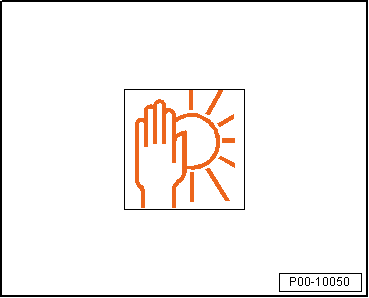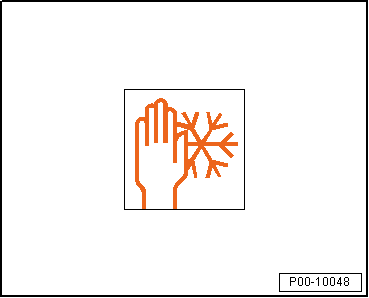Volkswagen Golf Service & Repair Manual: Permanent underbody protection -D 314 D37 M2-, black
| Permanent underbody protection -D 314 D37 M2-, black |
| Product description, permanent underbody protection -D 314
D37 M2-, black |
| Permanent underbody protection -D 314 D367 M2- is a black
coating compound based on an aqueous synthetic resin dispersion
which can be sprayed on using a UBS gun. |
| Drying time depends on the coat thickness as well as the
ambient temperature and humidity. Good ventilation and higher
temperatures accelerate drying. |
| The dried film adheres well to sheet metal, which is
galvanised or coated with electrophoretic primer, as well as to
painted substrates. Due to the great resistance to abrasion and
flexibility under cold conditions, permanent underbody
protection exhibits excellent stone-chipping protection. |
| Permanent underbody protection can be quickly overpainted
with water-based paints. |
| After air drying about 2 to 3 hours, the material can be
overpainted with conventional solvent-based paint systems as
well. |
| The dried coating is easy to sand after thorough hardening. |
| Permanent underbody protection is suitable for reproducing
the original structure following repairs. |
| The material is only temporarily resistant to naphtha and
cold cleaners. |
| Permanent underbody protection -D 314 D37 M2- is suitable
for repairing underbodies, wheel housings, and front end and
rear ends and can be applied to visible parts such as door sills
as paintable protection against stone chipping, road salt and
corrosion due to moisture. |
| The material is suitable for repairing various surface
structures following repairs to all sorts of vehicles. |
| Permanent underbody protection is suitable for deadening
noise from boots, bonnets, wheel housings and side panels as
well as covering and sealing repaired surfaces, welded joints
and overlaps. |
 Note Note
| Before using, read the safety measures and recommendations
in the safety data sheet. |
| Even for products which are not required by law to be
labelled, the usual safety measures for chemical products must
be observed. |
| The surfaces to be treated must be cleaned thoroughly
beforehand, and any rust must be removed. |
| The surfaces must be dry and free of dirt, dust and grease. |
| Surfaces which are not to be coated should be covered with
paper. |
| Bare steel surfaces are to be primed before application of
permanent underbody protection. |
| Permanent underbody protection is applied from the 1-litre
can using the UBS gun. The application pressure is 4-5 bar. |
| Shake the can vigorously for one minute before use. |
 Caution
Caution
| Do not spray onto joints, engine, propshaft,
exhaust, catalytic converter or brake system. |
| Blow out the UBS gun immediately after use and then
clean it with plastic cleaner -D 195 850 A1-D 195 850
A1. |
| If the UBS gun becomes blocked, the can may burst. |
| Observe the operating instructions of the UBS gun. |
|
 Note Note
| Permanent underbody protection can be overpainted with both
water-based and solvent-based paints. Due to the large number of
systems available in the market, test spraying is necessary. |
| 1 - |
Overpainting with water-based paints: |
| – |
After drying to a matt surface and up to 72 hours following
application, permanent underbody protection can be overpainted
using water-based paints. |
| 2 - |
Overpainting with conventional solvent-based paints: |
| – |
After drying thoroughly and up to 72 hours following
application, permanent underbody protection can be overpainted
using solvent-based paints. The material is a fast-drying
thick-coat system. When accelerating drying with forced air,
ensure that the fast-developed skin is not blown away over the
still-wet material on which it is floating. This can cause
cracking in the finish. |
| Splashes on painted surfaces should be removed immediately
using plastic cleaner -D 195 850 A1-. |
| Equipment and soiled parts must be cleaned with water
immediately after application, if necessary using a water-based
cleaning agent. Do not use any solvent-based cleaning agents,
for these cause coagulation. After drying, permanent underbody
protection can only be removed mechanically. |
|
|
|
|
Technical data: |
| Colour |
Black |
| Odour |
slight ammonia odour |
| Density |
Approx. 1.22 g/cmі |
| Solids content |
Approx. 67% |
| Viscosity |
0.5 Pas |
| Test equipment |
Physica |
| Test
method |
Z 4 |
| Wet application thickness |
1 mm |
| Thinner/cleanser |
Distilled water |
| Working temperature |
+10 °C to +25 °C |
| Use temperature |
-25 °C to +80 °C (+100 °C
briefly up to 1 hour) |
|
Acoustic data: |
| Loss factor
DIN 53440 |
approx. 0.10 |
| Temperature: |
20 °C |
| Frequency |
200 Hz |
| Material |
Sheet steel
1 mm |
| Relative thickness
of coating to sheet metal |
2:1 |
| The guaranteed shelf life is 12 months from date of
production. May be used until the date stated on the label at
latest if stored in sealed original containers at +20 °C. |
|
|

|
| The recommended storage temperature for permanent underbody
protection is +10 °C to 25 °C. |
| Permanent underbody protection is sensitive to freezing;
storage temperature must not drop below +5 °C. |
|
|

|
Designation:
Permanent underbody protection -D 314 D36 M2-, grey
Issued 02.2010
Product description, pe ...
Designation:
Permanent underbody protection -D 314 D38 M2-, light
Issued 02.2010
Product description
...
© 2016-2026 Copyright www.vwgolf.org

 Note
Note Note
Note Permanent underbody protection -D 314 D36 M2-, grey
Permanent underbody protection -D 314 D36 M2-, grey Permanent underbody protection -D 314 D38 M2-, light
Permanent underbody protection -D 314 D38 M2-, light
 Caution
Caution
